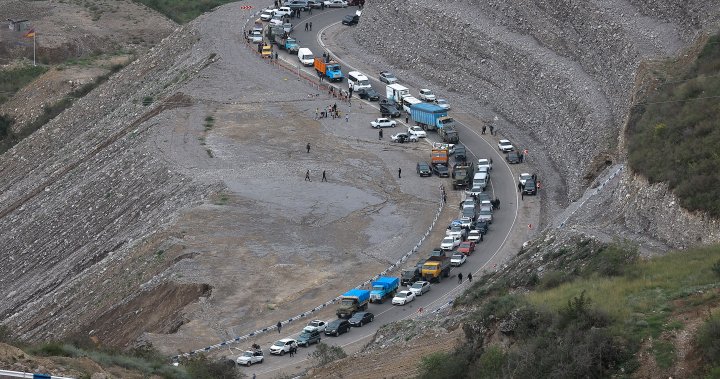
Nagorno-Karabakh: Separatist government to dissolve as half the population flees
Global News
The separatist government of Nagorno-Karabakh said it will dissolve itself and the unrecognized republic will cease to exist by year's end.
The separatist government of Nagorno-Karabakh said Thursday it will dissolve itself and the unrecognized republic will cease to exist by year’s end after a nearly three-decade bid for independence, while Armenian officials said over half of the region’s population has already fled.
The moves came after Azerbaijan carried out a lightning offensive last week to reclaim full control over the region and demanded that Armenian troops in Nagorno-Karabakh disarm and the separatist government dissolve itself.
A decree signed by the region’s separatist President Samvel Shakhramanyan cited an agreement reached Sept. 20 to end the fighting under which Azerbaijan will allow the “free, voluntary and unhindered movement” of Nagorno-Karabakh residents to Armenia.
That touched off the mass exodus of ethnic Armenians from the mountainous region inside Azerbaijan on Sunday. By Thursday morning, over 66,000 people – more than half of Nagorno-Karabakh’s population of 120,000 had fled to Armenia, and the influx continued with unabating intensity, according to Armenian officials.
After separatist fighting ended in 1994 following the collapse of the Soviet Union, Nagorno-Karabakh came under the control of ethnic Armenian forces, backed by the Armenia. Then, during a six-week war in 2020, Azerbaijan took back parts of the region in the south Caucasus Mountains along with surrounding territory that Armenian forces had claimed earlier.
Nagorno-Karabakh was internationally recognized as part of Azerbaijan’s sovereign territory.
In December, Azerbaijan imposed a blockade of the only road connecting Nagorno-Karabakh with Armenia, alleging the Armenian government was using the road for mineral extraction and illicit weapons shipments to the region’s separatist forces.
Armenia alleged the closure denied basic food and fuel supplies to Nagorno-Karabakh. Azerbaijan rejected the accusation, arguing the region could receive supplies through the Azerbaijani city of Aghdam – a solution long resisted by Nagorno-Karabakh authorities, who called it a strategy for Azerbaijan to gain control of the region.

